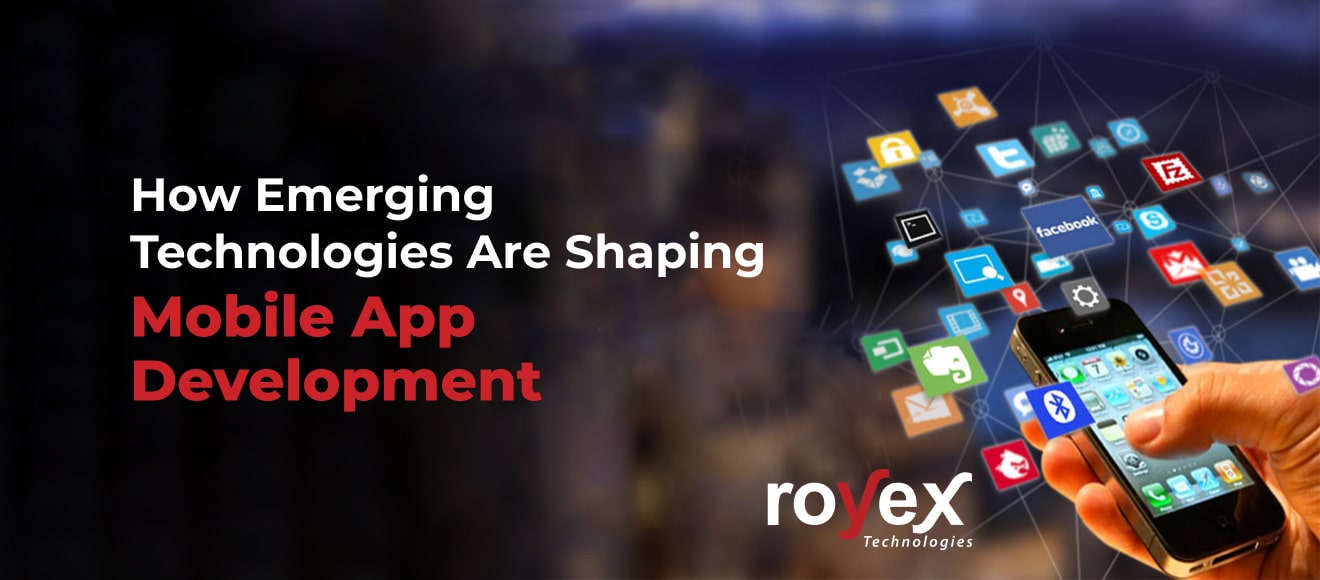
How Emerging Technologies Are Shaping Mobile App Development
Ever thought about why the mobile apps we use daily are so personalized, easy to use, and interesting? How they can smoothly combine digital content with reality or even take us to completely immersive virtual worlds? Cutting edge technologies pushing mobile app improvements serve as the answer. Our smartphones act like small computers we carry around and the apps are continually getting better. But it's no longer about cool new functions or bug fixes. The method by which apps are created is fundamentally altered by these advanced technologies.
By 2025, forecasts suggest the global mobile app market will hit an enormous $366 billion, sparked by these exact advancements. With more than 7 billion mobile users globally, emerging technologies hold promise for a revolutionary change in our interaction with apps and our surroundings. Curious? Let's discuss how these advancements are disrupting mobile app development and the significant influence of AI, AR/VR, IoT.
Artificial Intelligence (AI) and Machine Learning (ML)

Artificial Intelligence (AI) and Machine Learning (ML) are key in making mobile apps smart and unique to each user. These advanced technologies enable apps to learn about your preferences over time, working like a personal helper that anticipates your needs. As an illustration, AI-enabled virtual helpers like Siri or Alexa can comprehend your voice instructions and questions in a conversational style. Furthermore, AI and ML give music apps the ability to suggest new tracks that you may enjoy or shopping apps the power to select specific product suggestions for you. On a more intricate level, these technologies monitor your app usage habits and responses in order to modify the total app experience. This is why your top choice apps appear to understand what you require and when you require it be it delivering personalized news articles, recommending departure times for meetings based on current traffic conditions, or even predicting which emoji you might choose next. Through AI and machine learning, mobile apps essentially adjust themselves according to your needs.
Augmented Reality (AR) and Virtual Reality (VR)
Augmented reality (AR) and virtual reality (VR) are changing the mobile app experience. AR merges digital visuals and information with real world images from your phone's camera. For instance AR apps let you see how different glasses or jewelry would look on you by adding to your camera view. Some home design apps use AR to show you how furniture might look in your living room before buy it. VR takes this another step forward by placing users into digitally made 3D environments. Using a VR headset, numerous VR apps can bring incredibly life like virtual worlds for gaming, education, travel, and so much more. One could be exploring old ruins from thousands of years ago, walking through museum exhibits showing unique artifacts or flying through space while sitting comfortably at home. Through AR and VR, mobile apps are moving beyond the small screen, merging the physical and digital world for experiences that are more interactive, immersive and surprisingly realistic.
Internet of Things (IoT)
The Internet of Things is turning our homes, cars, and even our bodies into smart environments controlled by mobile apps. IoT refers to all the regular household items and technologies that can connect to the internet and communicate with each other. This allows your mobile apps to basically serve as a remote control for your entire life. Using IoT-enabled apps, you can control smart home devices like lightbulbs, thermostats, security cameras, and appliances all from your phone. Some apps can start your car remotely or check how much fuel is left. Wearable fitness trackers and smartwatches sync up health and activity data to apps. The possibilities are endless as more and more "things" become internet-connected. Rather than having separate apps for every single device, IoT allows apps to unify control over your entire smart home, car, wardrobe of wearables, and more into one integrated experience. Your mobile device becomes the hub to monitor and remotely manage all the intelligent environments and technologies in your life with just a few taps. The Internet of Things is making our apps far more powerful and convenient by connecting previously "dumb" objects to the digital world.
Blockchain

While blockchain is best known for powering cryptocurrencies like Bitcoin, this decentralized and secure recording system is being revolutionized for other use cases in mobile apps. At its core, a blockchain is like a invisible, tamper-proof digital ledger that chronologically records transactions or data in "blocks" across a network of computers, rather than relying on a central authority. This decentralized verifiability makes blockchains incredibly secure and transparent. Mobile apps are tapping into these benefits for uses like supply chain tracking, allowing you to see every step of a product's journey from source to delivery. Other blockchain-enabled apps let you create secure digital ID storage to protect you from identity theft. Blockchain is even being explored for mobile voting apps to increase election security and transparency. In the healthcare realm, blockchain apps ensure the integrity of medical data. The possibilities are endless due to blockchains' security, decentralization, and ability to cut out the middleman. As this budding technology becomes more accessible, we'll likely see blockchain quietly underpinning more mobile app experiences that require verifiable record-keeping and trusted data sharing.
5G and Edge Computing
The combination of 5G and edge computing creates a significant change in the field of mobile app development, sparking new ideas and improving the user experience. 5G's exceptional speed, minimal lag time, and large bandwidth possibilities, along with edge infrastructure's distributed computing power, give developers a broader platform to build realtime applications that were once limited by network restrictions. This complementarity allows developers to create modern apps that fully utilize developing technologies like augmented reality (AR), virtual reality (VR), of Things (IoT), and artificial intelligence (AI). The minimal time provided by 5G networks, together with edge computing resources positioned near final users, lets apps process data and carry out commands rapidly. This is having a transformative effect on many sectors including gaming, entertainment, healthcare, and manufacturing. Now mobile apps can smoothly combine realtime data processing, analysis, and decisionmaking at the edge which enable situations like realtime monitoring,predictive maintenance,and custom content delivery. Plus,the unison of 5G and edge computing provides rich opportunities for selfrunning systems and connected gadgets,this drives the building of advanced apps that alter human interaction with technology. Mobile app development is changing as developers use the massive potential of 5G and edge computing towards a future where quick responses,intuitive design,and intelligent systems come together to offer unrivaled user experiences that surpass imagination’s limits.
Progressive Web Apps (PWAs)
Progressive Web Apps (PWAs) are transforming the way mobile applications are developed, combining the ease of access and broad reach of the web with the features and user experience typically offered by native mobile apps. PWAs differ from traditional apps as they're made using web technologies like HTML, CSS, and JavaScript, yet provide a similar user experience to native apps with offline access, push notifications and integration with device hardware. This combination aids developers in making universal applications that function smoothly on various devices and operating systems, eradicating the necessity for creating individual apps for each platform. Additionally, PWAs focus on being swift, light, and adaptable to improve performance irrespective of user's network connection or device capabilities. The option to install them straight from the web browser without through an app store makes their distribution process simpler and more userfriendly. Added to this is the notion of progressive enhancement used in PWAs which lets them adapt to deliver advanced features where possible while ensuring a solid operation on older or less advanced platforms. This approach democratizes app development by allowing businesses and developers to serve a wider audience using one codebase while providing rich applike experiences competitive with native ones. The continuous evolution of PWAs, accompanied by its growing acceptance worldwide indicates PWAs hold promise for the future direction of mobile application development as a more costeffective, flexible and inclusive method.
Low-Code and No-Code Development
Traditional app development methods are being supplanted by low-code and no-code development which is changing how mobile apps are created, making it easier for people without extensive coding knowledge to build their own apps. With these platforms, developers can drag and drop pre-built components to create apps quickly, without having to write a lot of code from scratch. This means that more people can get involved in app development, from business professionals to hobbyists, without needing years of training in programming languages. Low-code and no-code tools also speed up the development process, allowing apps to be built and deployed much faster than traditional methods. Plus, they make it easier to update and maintain apps over time, since changes can be made without diving into complex code. As a result, mobile app development is becoming more accessible and efficient, opening up new opportunities for innovation and creativity in the digital world.
In conclusion, emerging technologies are reshaping the landscape of mobile app development, offering unprecedented opportunities for innovation and user engagement. As these technologies continue to evolve, the future of mobile apps holds boundless possibilities, transforming how we interact with technology in our daily lives.
Established in 2013, Royex Technologies is a leading mobile app development company in Dubai, that provides innovative solutions for small, medium, and large-scale companies. We specialize in responsive web development, mobile app development, CRM integration, AI solutions for website & mobile applications, and many more. Our extensive experience in mobile app development will help you to take your business to a high level.
Check our portfolio to see our previous works. Contact us via email at info@royex.net or call us at +971566027916 to get started with us.





